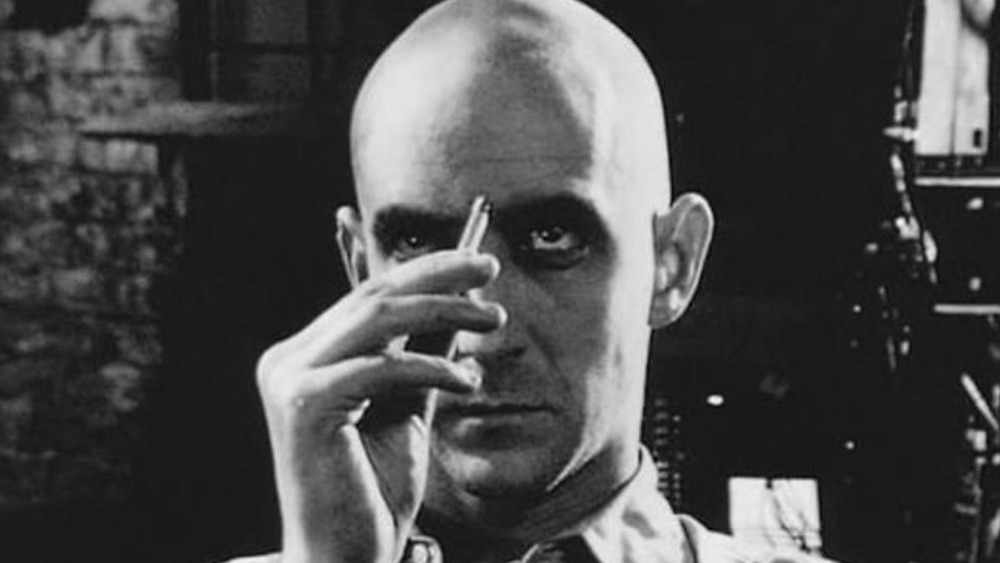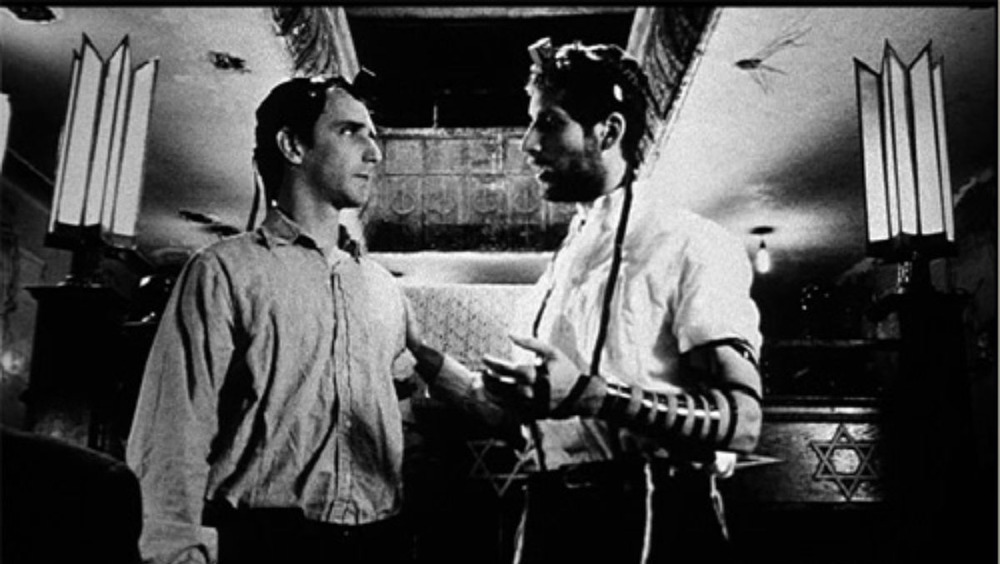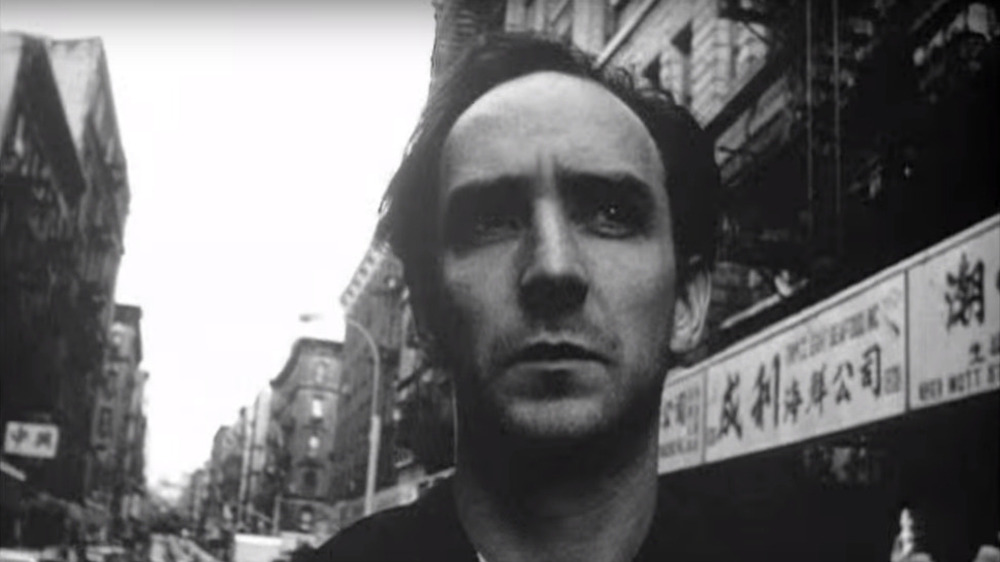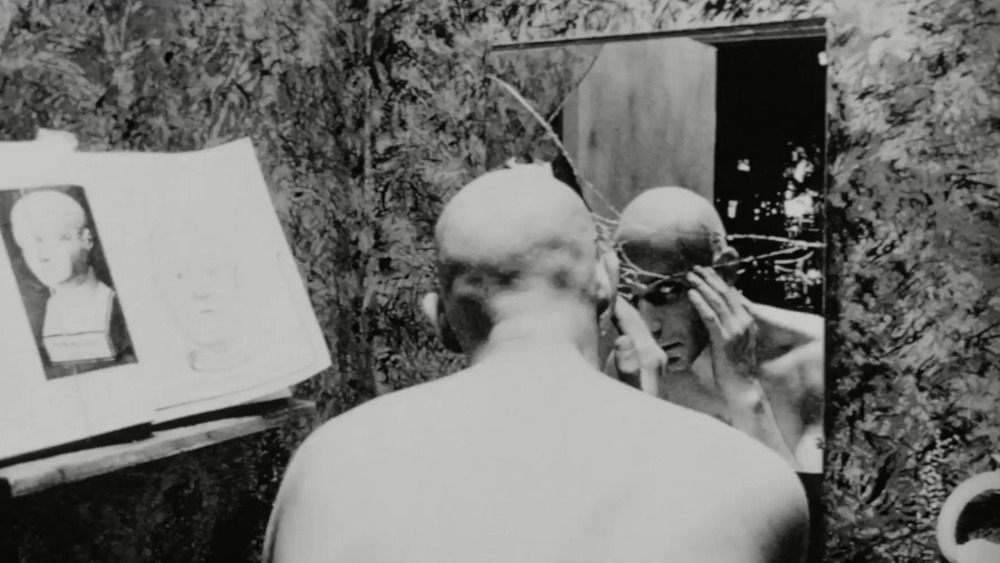The Ending Of Pi Explained
Darren Aronofsky makes the kind of movies that get under your skin. While many of his most lauded films aren't exactly blockbusters, they often become a lightning rod for deep discussion and controversy. Best known for films like Requiem for a Dream, Black Swan, and Mother!, Aronofsky has maintained a reputation as an auteur who can seamlessly blend elements of drama and horror while he tackles topics like drug addiction, perfectionism, death, and even the Biblical Noah's journey — you know, standard, run of the mill Hollywood stuff.
While many contemporary film fans are familiar with Aronofsky's most high profile projects, they may not be aware that he laid the groundwork for many of these themes in his first feature length work. Pi, released in 1998, is a psychological thriller about Max Cohen (Sean Guillette), a brilliant but troubled mathematician who sees numerical patterns in the world around him, and struggles to make sense of their meaning. Produced on a famously low budget (via Filmmaker Magazine), Pi won Aronofsky a Best Director trophy at Sundance and was a sleeper hit among cinephiles — and its mind-bending story still holds up today.
Pi deals with the quest for a sense of order and the meaning of life, and how that feeds into Max's paranoia and deteriorating health. Because of its often surreal narrative structure, even those that have seen Pi sometimes struggle to understand its ending. Let's take a look at what happens in the film's final moments and how it can be interpreted — but please be mindful, there will be spoilers.
Pi tells the story of a brilliant mathematician driven to the brink by his obsession
Darren Aronofsky once said that Pi — which remains one of his best films, more than 20 years since its release — is, in some ways, the story of a "mad scientist," per Indie Wire. That's clear from the opening voiceover by the film's protagonist, Max. He tells us that when he was a child, his mother warned him not to look into the sun — which compelled him to do exactly that. He went temporarily blind, he says, and the darkness he experienced before he regained his vision was terrifying and isolating.
This insight into Max's psyche perfectly sets up the rest of the story. It tells us that he has always been one to let his curiosity get the best of him, and drive him to take extreme measures. That's what we see him do throughout Pi. When we encounter him in the present day, he's an unemployed mathematician, who is trying to reconcile his understanding of the world, as well as find a purpose and sense of order to existence, by proving his theory that everything in nature can be explained in numerical patterns.
After programming his computer to make stock market predictions, it malfunctions and prints out a random 216-digit number. When he learns his mentor Sol (Mark Margolis), has also encountered this exact number, he becomes obsessed with understanding it, and figuring out how it fits into his beliefs about the world.
Max's obsessive need to understand the pattern has dangerous results in Pi
Pi shows us that even genius has its limits, when the people who possess it give in to their obsessions. Max's quest to understand the pattern only brings about more questions, more stress and an increasing sense of isolation and paranoia — as though he stared into the sun once again, but didn't look away. Max's mental state deteriorates as the pressure on him grows. Every time he seemingly gets close to finding the pattern, something disastrous happens. Leaders at a local synagogue push him for answers about the number, believing it will unlock answers about God. His computer crashes while he's trying to calculate the pattern. The stock market crashes after Wall Street agents attempt to use the number to rig it. And Sol dies of a stroke after seemingly working with the number, even after he cautioned Max to quit his work.
All the pressure and agony manifests itself in Max's increasingly frightening visions and debilitating migraines, which cause a large vein to begin to bulge in his head. As Max's sanity becomes increasingly questionable, we have to question how much of what we're seeing is even real. What is clear is that even if he can find the answer at the end of the pattern, the toll of this knowledge is too much. He has to choose between his curiosity, which has guided him toward self-destruction since childhood, and his sanity, which is at the point of no return — and, it seems, he chooses the latter.
At the end of Pi, Max finds an answer... just not the one he was looking for
After destroying his computer and burning a piece of paper with the 216-digit number, Max takes a cranial drill to the vein in his head. While we don't see the immediate aftermath of his impromptu surgery, the film ends with him encountering Jenna (Kristyn Mae-Anne Lao), a young girl he's discussed math with throughout the film. When she asks him to do a simple math calculation, he's unable to give her an answer, and it becomes clear that whatever he did to alleviate his headaches also seems to have eliminated his gift with numbers, too. Except, he doesn't care in the slightest. In Pi's final moments, we see Max sitting serenely on a park bench, enjoying the breeze as it wafts through the trees, seemingly without a care in the world.
Pi is not the only Darren Aronofsky film to have a complicated ending. Despite its dealings with numbers and patterns, Darren Aronofsky once said it's not a math movie, and characterized it as a "mystical" movie instead (via Indie Wire). Indeed, at the end of Pi, there are no answers. Instead, it shows us how closely genius and madness are intertwined, how hard it can be to reconcile the rational and the irrational — and it reminds us that some questions may be better left unanswered.



